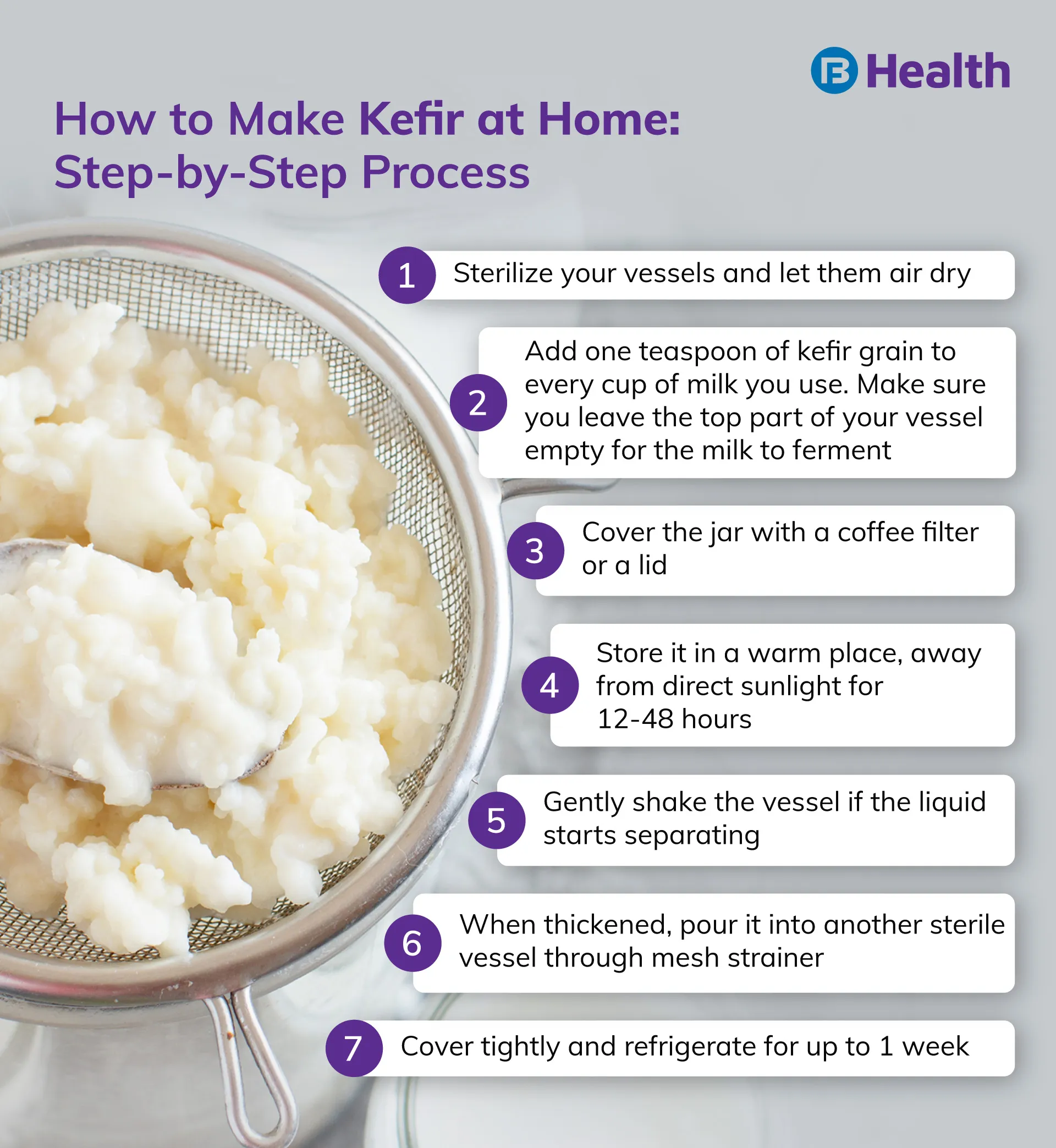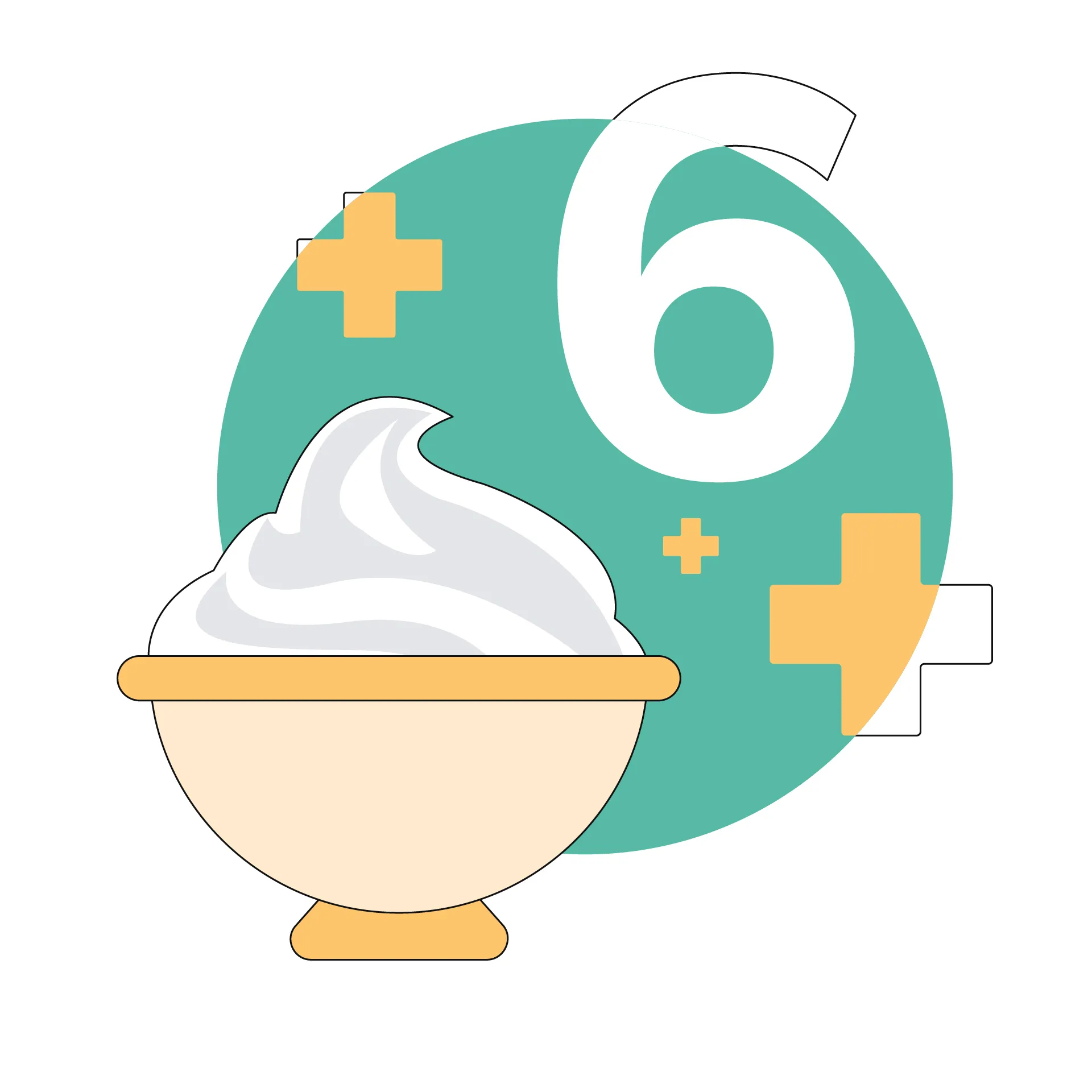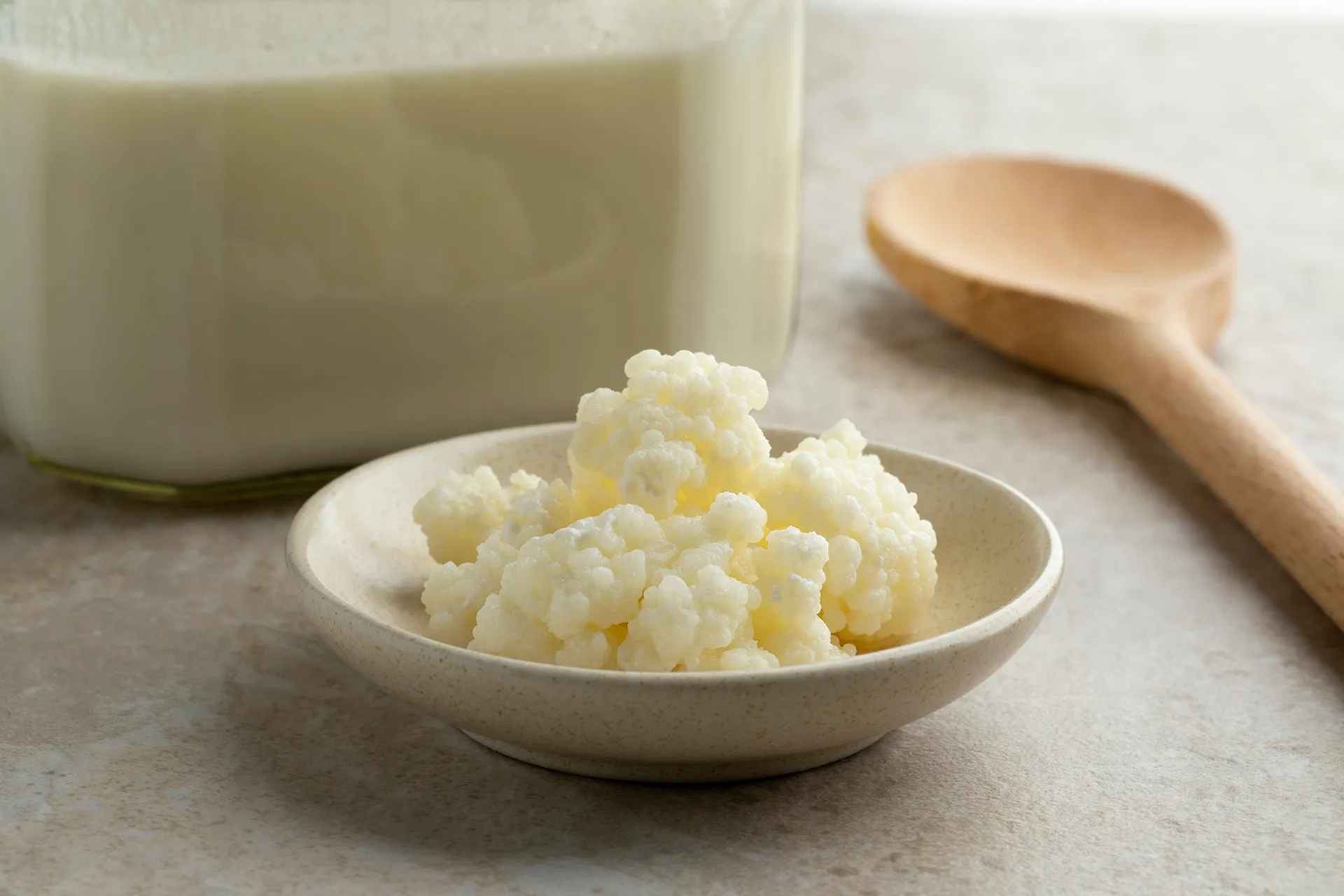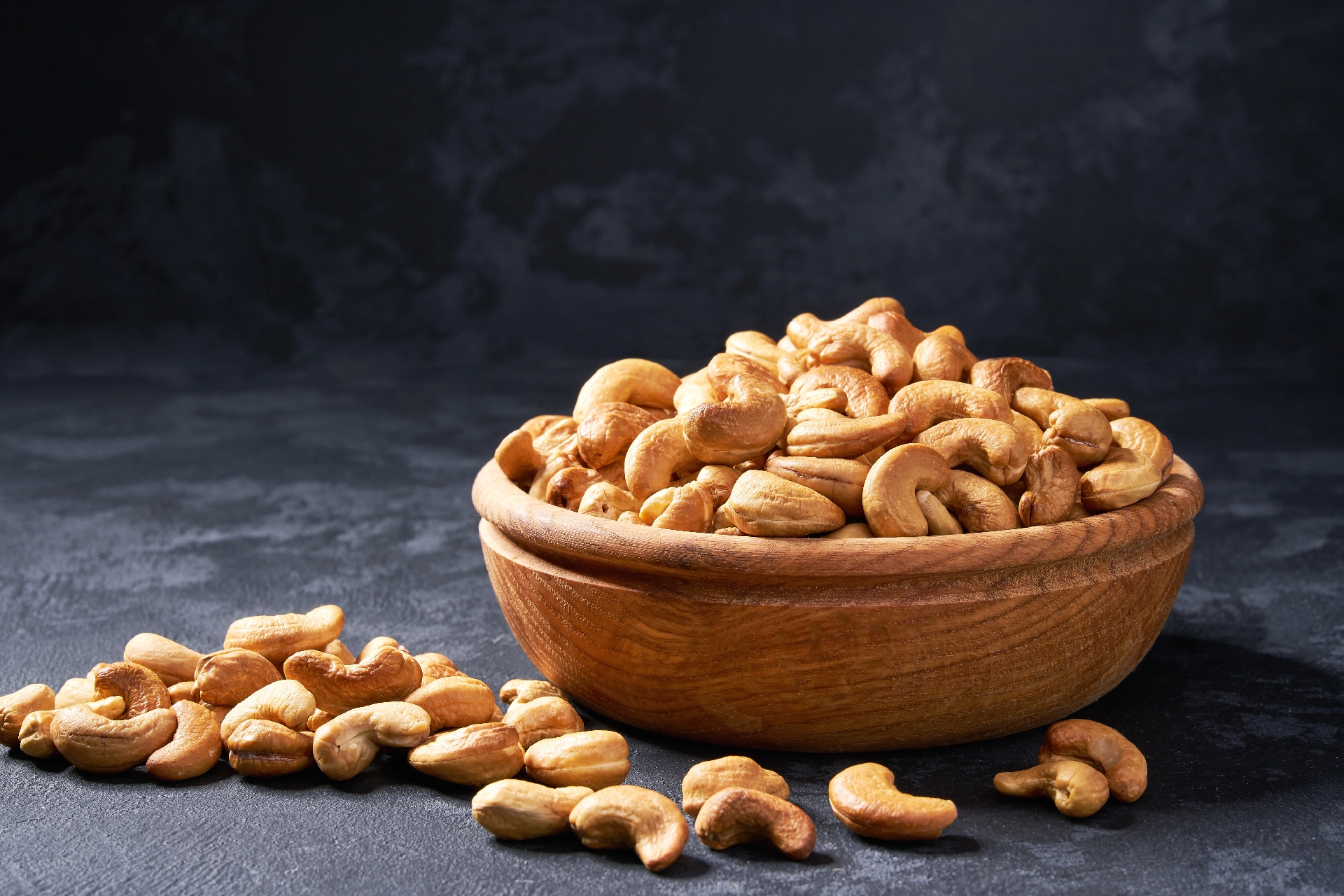General Physician | 10 min read
Amazing Benefits of Kefir, Nutrition Value and Side Effects
Medically reviewed by
Table of Content
Key Takeaways
- Kefir is a drink usually made of fermented milk that tastes sour and tart
- Kefir benefits include improving bone health, immune system, and gut health
- Kefir milk & water are made from different grains & have different properties
Kefir is a drink made of fermented milk and offers many health benefits. Due to fermentation, kefir grains have yeast and live bacteria and are beneficial for your health. Apart from them, kefir is also rich in calcium.
Kefir originates from Turkish term ‘keyif’ which translates to ‘good feeling’ you may get after drinking it. It has a similar appearance to that of yogurt but is thinner in consistency. Kefir milk has a sour and tart taste along with some fizz caused by carbon dioxide. The time you spend for fermenting kefir determines its flavor.
As a result of the benefits that kefir offers, many people consider it to be better than yogurt. Read on to know about how kefir is different from other milk-made drinks, and the top kefir benefits for your health.
How Is Kefir Different From Buttermilk And Yogurt?
Kefir, buttermilk, and yogurt may seem similar but have different properties. Unlike kefir, yogurt has fewer probiotics. Buttermilk on the other hand is a result of churning yogurt. Though some types of buttermilk may contain live cultures, it mostly consists of lactose, casein, and water.
Nutrition Value of Kefir
Each kefir teacup includes:
- Energy: 109 Kcal
- 6.2 g of proteins
- 7.2 g of carbs
- Fats: 6.2 g
- Fiber: 0
- 6% of the daily value (DV) for vitamin A
- 30% calcium (DV)
- 4% sodium (DV)
How To Make Kefir At Home
To prepare Home Kefir, one will want a sterile setting and tools to stop the improper kinds of germs from entering the liquid. To start, one will require the following:
- Active kefirgrains that may be purchased, together with milk such as cow, goat, or coconut
- A silicone spatula
- A wooden spoon
- A paper coffee filter
- Cheesecloth
- A rubber band
- A glass jar
- A strainer with a nonmetal mesh
Making kefir requires:
- To sterilize the jar, wash it with hot, soapy water. Place it upside-down on a clean drying rack to air dry.
- Add milk to the glass jar after it is dry. For each cup of milk, use one teaspoon of kefir grains. As the liquid ferments, it will expand, so leave room at the top.
- The paper coffee filter should be placed over the jar and fastened with a rubber band. For 12 to 48 hours, keep the jar in a warm location at or near 70°F (21°C). If the liquid begins to separate, shake the jar gently while keeping it out of direct sunlight.
- Pour the liquid through the mesh strainer into a sterile storage container after it has thickened. Refrigerate for up to a week with a securely sealed cover.
Kefirwill be sweeter if the fermentation process is shorter; a longer fermentation will result in a more tart beverage. People can keep the kefir grains they catch in the strainer and utilize them in later batches of kefir.

What Is The Kefir Benefits
Strengthens Heart Health
Disorders of lifestyle are one of the main causes of heart health problems. Medical conditions, including atherosclerosis, excessive cholesterol, hypertension, etc., may harm heart health. High quantities of harmful fats, or saturated fats, are mostly to blame for various ailments in our bodies.
Kefirmay help the body produce less serum triacylglycerol and cholesterol. These are bad lipids that might build up in the arteries and result in blockages. Additionally, the probiotic bacteria in kefir help improve the body's fat metabolism. They aid in bile acid formation, which breaks down and processes lipids. The likelihood of developing cardiac issues linked to lifestyle decreases when harmful fats in the body are reduced.
Additionally, kefir helps lower high blood pressure. The microorganisms present in kefir's fermented byproducts can regulate blood pressure. Kefir, for instance, inhibits the production of aldosterone, a hormone that raises blood pressure.
Strengthens liver health
By lowering fatty liver syndrome, kefir can enhance liver health; when there is an increase in fat deposition in and around the liver.
Kefir may be able to lessen the buildup of fat around the liver. Enhancing lipid metabolism in the body can also reduce cholesterol and triglyceride deposits in the liver. In addition, it lessens the amount of extra fat that is deposited throughout the body as a result. It also promotes the health of the organs.
Enhances Kidney Health
Kefircan help the body have less uric acid and creatinine. Kefir has a probiotic population that may ingest and break downs harmful waste like creatinine and uric acid. This can therefore help to lighten the burden on the kidneys.
Enhances Skin Health
Kefir benefits skin health and lessens imperfections. Additionally, it can help with skin irregularities, including eczema, burns, and scarring. The probiotics' cell membranes, bacterial metabolites, and dead bacteria all contribute to better skin health. These substances also assist in enhancing the skin barrier and limit other bacteria's development.
For instance, probiotics' hyaluronic acid aids in the healing of wounds. In this instance, it could aid in the healing of skin scars. As a result, hyaluronic acid is now present in many cosmetic products to support skin repair.
Kefir for Losing Weight
Kefirconsumption may result in metabolism modulation. It is because it contains minerals, vitamins, and probiotics. It aids in increasing metabolism. The body's excessive fat accumulation is reduced as a result. It aids in the body's removal of toxic substances and hazardous compounds. Additionally, the anti-inflammation, hypercholesterolemia, and probiotic benefits of kefir may work together to promote healthy weight reduction.
Kefir might fill you up after a few sips. It thus lessens the desire to binge or overeat. Kefir can also aid in weight loss when substituted for processed and sugary meals. The fact that it offers a plentiful supply of probiotics might also help with digestive health, so it can assist you with a healthy diet plan.
Improves bone health
Osteoporosis is a common health condition related to deterioration of tissues in your bones. One effective way to improve your bone health is by ensuring your calcium intake is adequate. Kefir is a rich source of calcium and vitamin K2, which also plays plays a vital role in metabolizing calcium. Apart from this, kefir is also known to increase calcium absorption leading to improved bone density [1].
Improves gut health
Kefir probiotics may help retain the balance of good gut bacteria. That is what makes drinking kefir an effective remedy for treating diarrhea. Probiotics may help alleviate digestive problems such as irritable bowel syndrome (IBS), according to a study [2].
Manages blood sugar levels
According to research, consuming kefir can reduce fasting blood sugar levels in people with type 2 diabetes [3]. Studies also show that kefir is beneficial for people with diabetes as well as obesity. But more research is needed in this matter.

Lowers cholesterol levels
The probiotics present is kefir may help in determining how much cholesterol gets absorbed by your body. It may also have an effect on the quantity of cholesterol production, use, and process.
In a study, drinking kefir for eight weeks led to significant decrease in total cholesterol and LDL levels [4]. As high cholesterol levels are linked to a number of health conditions including heart ailments, consuming kefir may also help you manage them.
Prevents infections
One of the kefir benefits is that it helps kill pathogens which can lead to infections. Kefir grains may kill bacteria like Salmonella, Staphylococcus aureus, and Escherichia coli [5]. They may also help in preventing vaginal infections or gastroenteritis. However, more research is required to know the exact effects of kefir.
Boosts your immune system
As a result of the good bacteria, drinking kefir may also boost your immune system. It may help prevent and reduce the risk of respiratory, urinary tract and intestinal infections. Kefir can help suppress your inflammatory responses caused by asthma and allergic reactions, as per a study [6].
Apart from this, daily consumption of kefir may also help optimize the levels of immune cells and control inflammation [7]. Including kefir in your morning meal may be an ideal immunity-boosting breakfast!

Healthy Recipes Using Kefir
Domestic kefir
Servings: four
Time: 5 minutes for preparation
Ingredients:
4 cups of milk
Grains for kefir: 1 Tbsp
Method:
- Pour 4 cups of milk and one tablespoon of kefir grains into a container.
- Put a lid on the jar and fasten it.
- Place the pot aside and allow it to ferment for a day at room temperature.
- Prepare glasses by straining the liquid. kefirmay be kept for two weeks in the refrigerator.
- You may sweeten it with honey or sugar.
Note: To begin a fresh batch, put the kefir grains that were gathered in the sieve back into the first jar and add 4 cups of milk.
Side Effects of Kefir
- Kefirprepare from cow's milk should not be consumed by those who are allergic to milk. They may, however, use their preferred brand of milk in its place. Kefir, without additional sugar, should be consumed by people with diabetes.
- If consumed in excess, kefir can produce bloating, gas, cramps, nausea, and constipation. However, these symptoms won't appear if you drink 1-3 cups of kefir every day.
- Kefir includes a high concentration of probiotics. Therefore, everyone should take it.
- For instance, kefir shouldn't be consumed by those with compromised immune systems. Those who are receiving treatment for cancer should also refrain from consuming kefir.
- Homemade kefir is preferable to store-bought kefir. Kefir from the store may include extra sugar and preservatives. However, homemade kefir is more nutritious, fresh, and inexpensive.
Kefir Vs Yoghurt Vs Buttermilk
Dairy products that have undergone fermentation include buttermilk, kefir, yogurt. They do, however, possess a few minor differences.
Kefir and yoghurt are both created from milk that has been fermented with beneficial bacteria, making them quite similar. They have comparable nutritional profiles, a fair amount of protein, and low-fat content. Both may be made using dairy-free milk substitutes, and consumers can utilize them in dishes in a similar manner.
Kefir and yogurt are not the same as buttermilk. It is a thin liquid that is produced as waste when butter is churned. Not all buttermilk has living cultures. It is largely made up of lactose, casein, and water.
Buttermilk is frequently used in baking. However, some people also consume it.
How Is Kefir Water Different From Kefir Milk?
Kefir water is different from kefir milk because it is made from different types of grains. For kefir water, the grains are put in a sugared water instead of milk. Note that the fermentation process is the same as kefir milk. You can sweeten the water with the help of fruit juice or cane sugar.
Kafir water can be a great alternative to milk if you are following a dairy-free diet. Do remember that it may not contain the same calcium and protein content as opposed to kefir milk.
Additional Read: Delicious Non-Diary Milks to Include in DietApart from having a healthy, well-balanced diet, it is important to keep an eye on any symptoms your body may present. Contact a doctor immediately when you see signs of a health condition. This will help you stay on top of your health and get the right treatment at the right time. Book teleconsultation or online consultation appointment with trusted doctors on Bajaj Finserv Health. You can find a doctor in your area by using doctor near me feature. This way you can put your worries at ease with the help of experienced doctors and stay ahead of your problems!
References
- https://pubmed.ncbi.nlm.nih.gov/25278298/, https://pubmed.ncbi.nlm.nih.gov/19220890/
- https://www.ncbi.nlm.nih.gov/pmc/articles/PMC4401881/
- https://www.lipidjournal.com/article/S1933-2874(16)30414-7/fulltext
- https://www.ncbi.nlm.nih.gov/pmc/articles/PMC3833126/
- https://pubmed.ncbi.nlm.nih.gov/17869642/
- https://pubmed.ncbi.nlm.nih.gov/23621727/
Disclaimer
Please note that this article is solely meant for informational purposes and Bajaj Finserv Health Limited (“BFHL”) does not shoulder any responsibility of the views/advice/information expressed/given by the writer/reviewer/originator. This article should not be considered as a substitute for any medical advice, diagnosis or treatment. Always consult with your trusted physician/qualified healthcare professional to evaluate your medical condition. The above article has been reviewed by a qualified doctor and BFHL is not responsible for any damages for any information or services provided by any third party.





